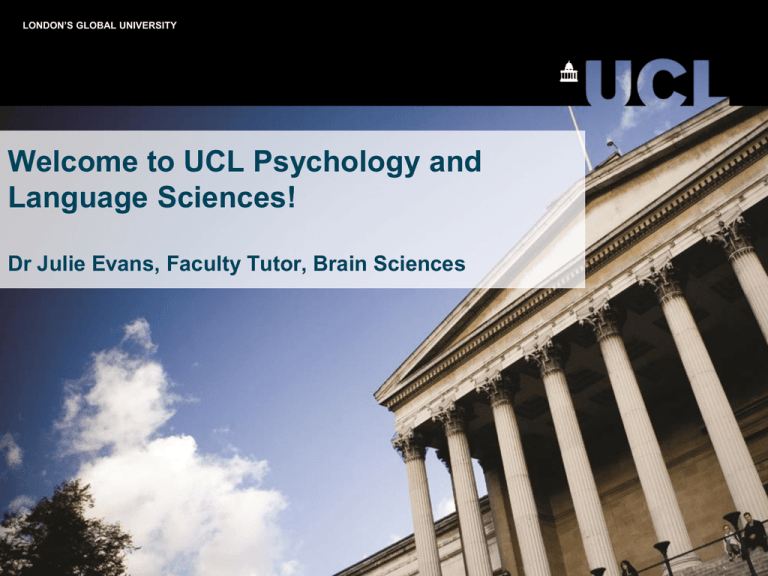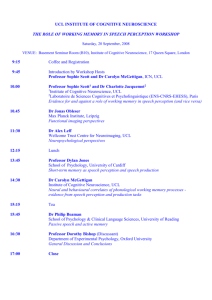Welcome to UCL Psychology and Language Sciences!
advertisement

LONDON’S GLOBAL UNIVERSITY Welcome to UCL Psychology and Language Sciences! Dr Julie Evans, Faculty Tutor, Brain Sciences Why UCL? Perfectly located to ensure you fully benefit from all London has to offer Access to cutting-edge technology and facilities Huge range of clubs and societies Smaller community within London, where you will find all the support you need Worldwide Reputation • UCL is rated as the top UK university by research strength (REF2014) • UCL Psychology, Psychiatry & Neuroscience are rated first in the UK for research power (REF 2014) • UCL is ranked joint 5th with Oxford in the QS 2014 World University Rankings. • UCL Neuroscience is ranked second worldwide (behind Harvard), in the field of neuroscience and behaviour. This expertise allows us to design and deliver a firstclass education in a global environment. Student Support and Wellbeing • • • • Personal Tutors Peer Mentors Faculty Tutor UCL Central Support – – – – – – – – Student Support and Wellbeing Disability Services Gower Place GP Practice Chaplain and Multi-faith Adviser Student Funding Welfare Adviser UCL Advances: enterprise UCL Careers and Employability UCLU (including Rights and Advice) Transition programme The Transition programme supports all new students in adapting to university life, assisting first years with social, academic and personal issues. This is done through: Advice before you enrol Mentoring Scheme Study Skills Workshops Peer Assisted Learning General guidance and support UCL Managed Accommodation Two types: halls of residence (catered) and student houses (self-catered) Approximately 3,700 study-bedrooms - most within 20 minutes walk of College. A safe and secure environment: live-in wardens for pastoral support Shared room in student house: from £96.60 pw Shared room in hall of residence: from £129.50 pw Single room in student house: from £105 pw Single room in hall of residence: from £160.65 pw Accommodation Application Requirements All single first-year undergraduate students entering UCL for the first time and requiring accommodation are guaranteed a place provided: Received and firmly accepted an offer of a place at UCL, conditional or unconditional by 31st May UCL is your first choice Have not previously lived in HEI accommodation in London You apply using the online application before the 31st May deadline: www.ucl.ac.uk/apply-for-accommodation £150 deposit required on acceptance of offer UCL Careers Service Nearly 900 employers come to our events each year Average starting salary of UCL graduate is £27,975 (national avg £20,903) UCL was 4th in the UK for employment prospects (Guardian 2013) 86% UCL graduates enter graduate level work (national avg 66%, HESA 2013) The British Psychological Society (BPS) (bps.org.uk) •Since 1987 the BPS has established and maintained the Register of Chartered Psychologists •Only those on the Register are allowed to use the title ‘Chartered Psychologist’ (C.Psychol.) •First step in becoming a Chartered Psychologist is obtaining a min 2:2 degree from an accredited course, this gives Graduate Basis for Chartership which is one of the entry requirements for postgraduate professional training. •You cannot practice as a professional Psychologist without going through the BPS training. – PLUS transferable skills for employability such as: • • • • • • • • • • analysis, synthesis, evaluation / problem-solving / critical analysis • information management - collecting & working on data • autonomy - critical responsibility for own work • communicating - in a professional manner, producing reports • group working - capacity to work constructively in a team • IT literate Human Resources Personnel Management Contact Dr Julie Evans Advertising for more information! Media Julie.evans@ucl.ac.uk Teaching Social Work Banking Retail Management Marketing Today, find out how you can be part of this exciting and stimulating environment! BSc Psychology • Dr Keith Langley BSc Psychology and Language Sciences • Dr Caroline Newton … plus, one of our current students • Dani Astbury LONDON’S GLOBAL UNIVERSITY BSc Psychology Dr Keith Langley cognitive developmental personality & individual differences biological social research methods *these are the compulsory BPS & QAA main topic areas Term Year 1 Courses 1 Statistical Methods Psychological Experimentation Concepts and Methods Two Subsidiary Courses 2 Social Psychology Psychology of Individual Differences Memory and Decision Term Year 2 Courses 1 Design and Analysis of Psychological Experiments Research and Quantitative Methods Brain and Behaviour Developmental Psychology 2 Health and Clinical Psychology Perception, Attention & Action Cognition and Language One Subsidiary Course Laboratory Work - Progression • Year 1: – All students run the same experiments • Year 2: – Assigned a demonstrator & 4 topical subject areas – Mini-project • Year 3: – Final year project (1 Unit ~ 15% final degree) – Many projects are published! Year 3 Courses Research Project Plus 6 options from: Topics in Neurobiology Personality & Intelligence Human Computer Interaction Language and Cognition Organisational Psychology Human Learning and Memory Advanced Multivariate Statistical Social Psychology Speech & Hearing Brain in Action Applied Decision Making Eye and Brain Genes and Behaviour Attention and Awareness Cognitive Neuroscience Clinical Psychology Psychology and Education Developmental Psychology LONDON’S GLOBAL UNIVERSITY BSc Psychology & Language Sciences Dr Caroline Newton Years 1 and 2 Year 1 Year 2 Evidence and Enquiry in Psychology Language and Cognition Introduction to Research Methods Development of Communication and Cognition Introduction to Language Introduction to Speech Science Memory Neural Basis of Perception, Memory and Language Perception, Attention and Learning Social Psychology Introduction to Generative Grammar The Psychology of Individual Differences Research Design and Experimental Methods Speech Production and Perception + 1 Option BSc Psychology & Language Sciences Early Years Placement Development of Communication and Cognition • • Placement in an Early Years setting (i.e. age 3-5 years) One morning a week in the Spring Term • Requires a DBS check / police check in home country Placement assignments Making structured observations Using standardised assessments Designing your own tasks BSc Psychology & Language Sciences Academic Tutorials Year 1 Year 2 BSc Psychology & Language Sciences Year 3 Research project The role of the motor cortex in the perception of vowel quality The relationship between family factors and children's theory of mind development Linguistic effects on children´s number knowledge. Mental health literacy: Public knowledge and beliefs about mental disorders in South Korea BSc Psychology & Language Sciences



